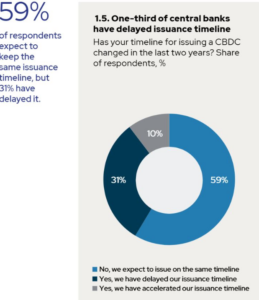Central Banks Hit Pause on CBDCs Amid Regulatory Uncertainty

Central banks around the world are hitting the brakes on their plans to launch central bank digital currencies (CBDCs). According to a recent survey by the Official Monetary and Financial Institutions Forum (OMFIF), 31% of central banks have delayed their CBDC initiatives, citing regulatory concerns and shifting economic priorities.
The survey, which included responses from 34 central banks, found that only 18% of institutions now favor issuing CBDCs—a significant drop from 38% in 2022. Meanwhile, opposition to CBDCs has grown, with 15% of banks explicitly stating they are unlikely to issue a digital currency, up from 0% in 2022.
 Source: OMFIF
Source: OMFIF
One major factor behind the delays is regulatory uncertainty. Many central banks are struggling to establish clear governance frameworks, especially around privacy and data protection. One respondent noted that privacy concerns, particularly the collection and storage of personal data, have become a “growing area of contention.”
Economic challenges have also played a role. Some central banks, facing rising inflation and debt crises, have prioritized other policies over CBDC development. As one survey participant put it, “Inflation and debt crises have forced us to focus on more pressing issues.”
The U.S. has taken a particularly strong stance against CBDCs. In January 2023, President Trump signed an executive order banning the creation and use of CBDCs within the country. While the crypto industry largely welcomed the move, some experts worry it could discourage other nations from pursuing their own digital currencies.
Despite the delays, most central banks still expect to launch CBDCs within the next decade. Proponents argue that CBDCs could improve payment efficiency and expand financial inclusion for underserved populations. However, critics warn of potential risks, including government surveillance and corruption.



